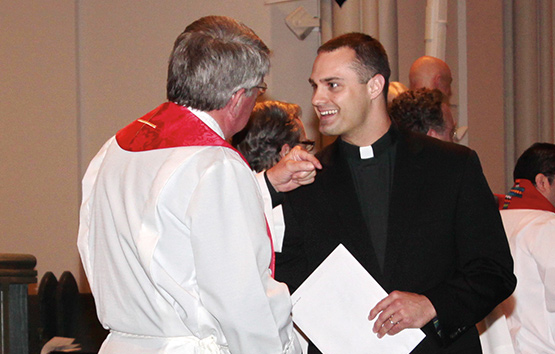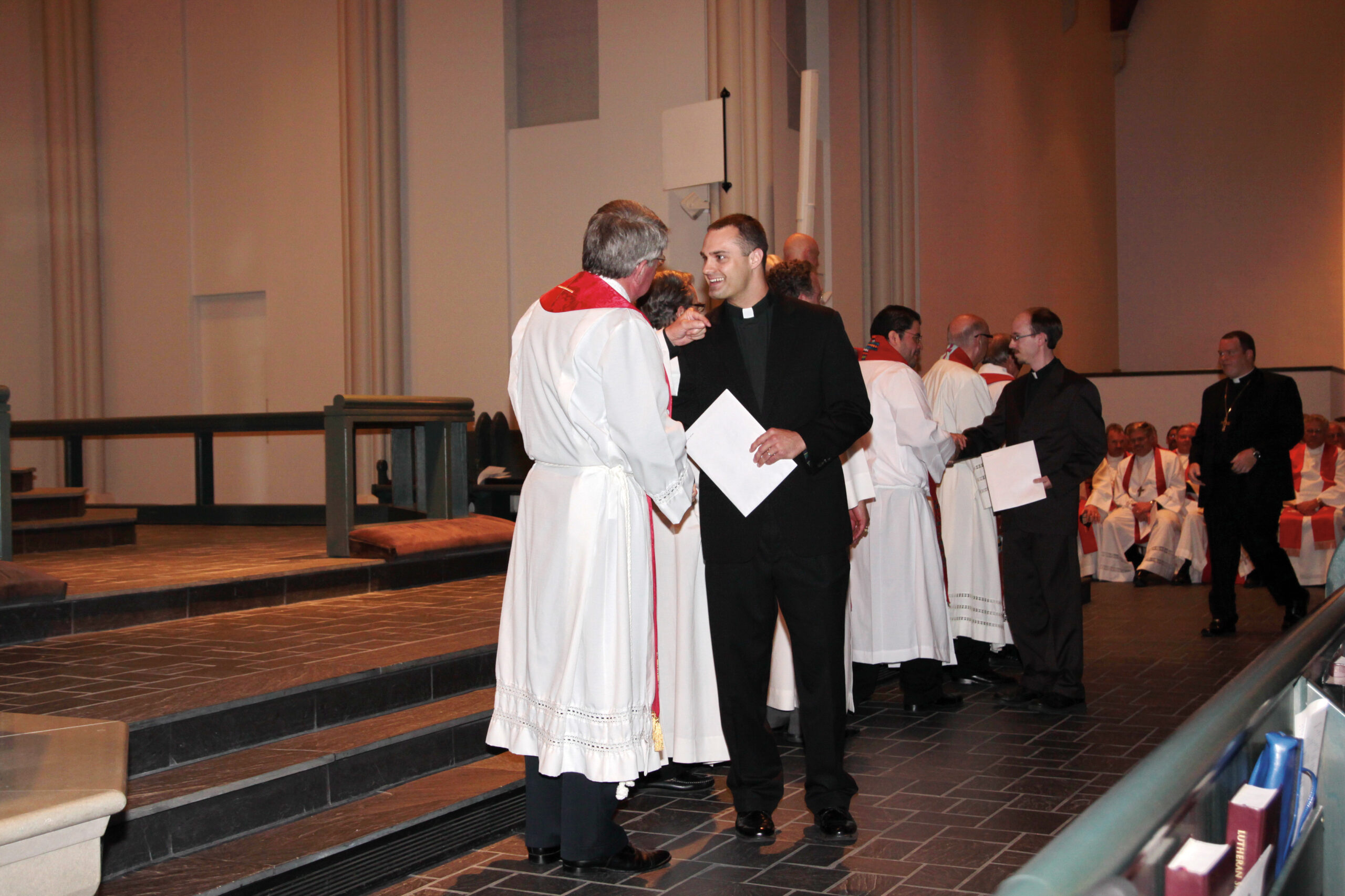
Concordia Seminary Newsroom
Student Spotlight: Serving as shepherd, servant

By Kendra Whittle
For Rev. Mike Fieberkorn, an opportunity to gather in Werner Auditorium at Concordia Seminary and listen to a former professor deliver a theological lecture is a chance to renew and refresh. An afternoon spent in Sieck Hall with a noted theologian is a privilege. Just stepping back onto the Seminary’s campus is a “reset button” for this Master of Divinity (M.Div.) graduate who is now pursuing a doctorate from his alma mater.
Fieberkorn is a 2013 Seminary alum who never wants to stop learning.
A Sturgis, Mich., native, Fieberkorn knew he was always interested in theology, an interest that piqued when he was in confirmation class as a teenager. However, after high school graduation, Fieberkorn decided to attend the Air Force Academy, fulfilling a dream to participate in Division I football along with the opportunity to serve his nation. Graduation from the academy meant a five-year commitment to serve and, as such, he began his professional life as a military officer.
“It was a time of discerning,” Fieberkorn said. “Do I want to do this or is God calling me to do something different? I felt like I would always wonder about being a pastor if I didn’t pursue it.” Along the way, he was encouraged by pastors and fellow congregation members who believed he had the gifts for ministry. In the end, Fieberkorn says he “decided God was calling me to spend my days in His Word, preaching and teaching.” Nevertheless, looking back, he recognizes his time in the military served as fantastic preparation for eventual service in the ministry — being a leader, working with people in real-life settings and being proactive during challenges.
After six years of active duty in the Air Force, Fieberkorn enrolled at Concordia Seminary to pursue a Master of Divinity so he could be ordained as a pastor. Upon graduation, he was called to St. James Lutheran Church in Quincy, Ill., in 2013, where he currently serves as senior pastor.
He said while the completion of his M.Div. and his first call were satisfying events, he felt a desire to continue his studies. He also was blessed with leftover funds from the GI Bill. He had already completed several class credits for a Master in Sacred Theology, so his initial plan was to complete that degree and be done.
But he said it soon became clear to him that he wanted to go further academically, so he began work on a Ph.D. as a reduced residency student at the Seminary. He said the decision to stay in the parish in Quincy as opposed to returning to St. Louis for full-time study was a matter of vocation.
“At the end of the day, my vocation as a pastor and as a husband and father was more important than my vocation as a scholar, but this was a way to do both,” said Fieberkorn, who is married with three young children. “The distance program is a good thing for me. As education changes and the church changes, I commend the Seminary for offering a Ph.D. Program that allows pastors to stay in the parish.”
Seminary Graduate School Director Dr. Beth Hoeltke agrees. “A reduced residency program allows our pastors to pursue intensive theological education, without taking them away from their congregations,” she said.
At present 72 students are enrolled in the Seminary’s reduced residency Ph.D. Program. The program includes about three years of course work, where students largely study and work from home. They come to campus for two weeks twice a year for intensive classroom study. Earning a Ph.D. typically takes about seven years. As such, the remainder of the students’ time is spent preparing for language and comprehensive content exams, as well as research and completion of a dissertation.
In his dissertation, Fieberkorn hopes to address discerning the will of God for how Christians live their lives.
Fieberkorn readily admits it’s a lot to manage, being a pastor and a graduate student, but he recognizes that there’s great benefit to him and his congregation. “I think it’s easy to fall into old patterns as a pastor,” Fieberkorn said. “But when you’re in the classroom and in the books, your mind is continually stimulated to learn new things, discover new things, and that carries over into Bible studies and other aspects of teaching and worship in the church.”
If that wasn’t enough, Fieberkorn is a strong proponent of the theological resources provided by Concordia Seminary for both pastors and laity. He is a regular attendee of the Seminary’s annual Theological Symposium and Multiethnic Symposium, which bring together pastors and theologians from around the country.
Fieberkorn acknowledges that since Quincy is just over two hours from St. Louis, it’s easy to commit to going to such events, but he says his love of theological study keeps bringing him back as well. He also says the opportunity to keep learning under his former Seminary professors is a blessing. “I think the Seminary and the professors are a huge gift to the church,” Fieberkorn said. “They create and offer Bible studies and sermon series and continuing education opportunities. They’re called there because the church has recognized them as gifted men, and so we owe it to ourselves to make use of their gifts.”
In addition to learning and growing academically, blessing the people of his parish with this knowledge, Fieberkorn says his advanced studies and participation in continuing education events have strengthened his personal faith and his calling from God.
“It’s a good reminder that I’m doing what I need to do,” Fieberkorn said. “When I come back to the Seminary, I am reminded that I am doing what I need to be doing in my life. The church needs to learn more about God’s Word if it is going to continue to grow.”

Mike Fieberkorn receives his call to Quincy, Ill., May 1, 2013.
Photo: Harold Rau